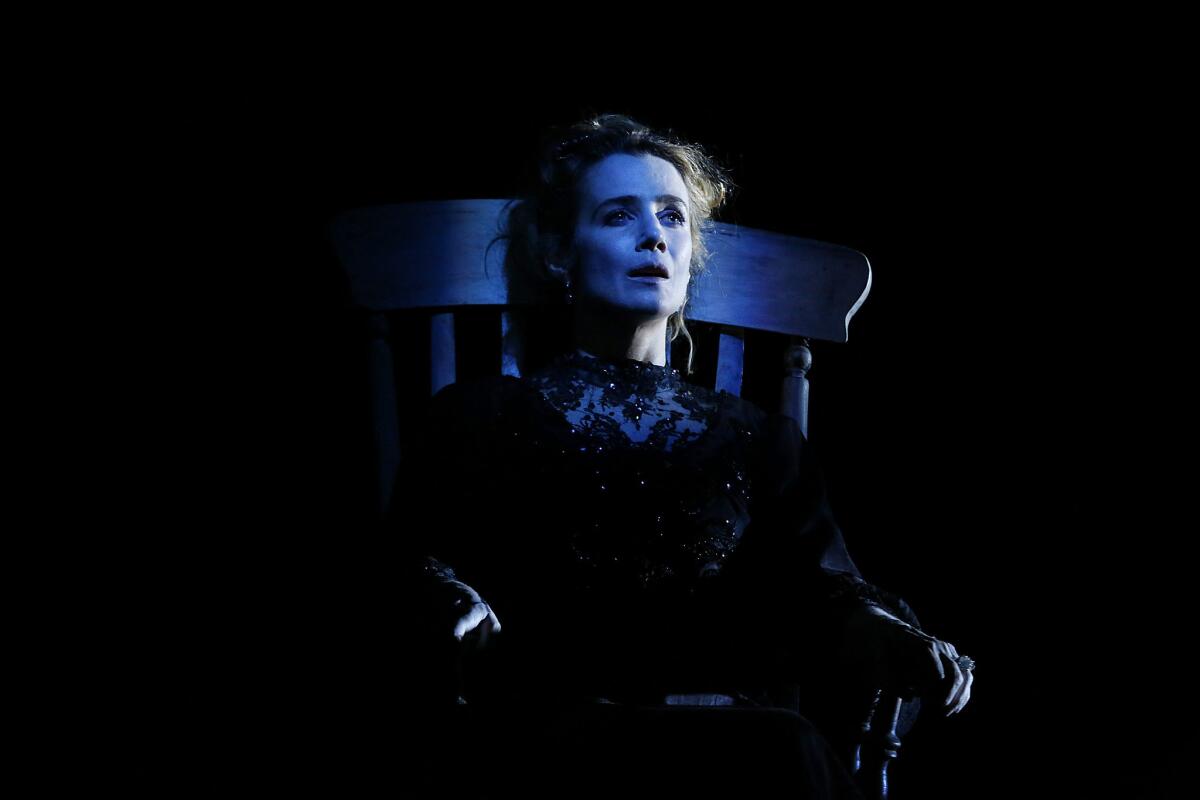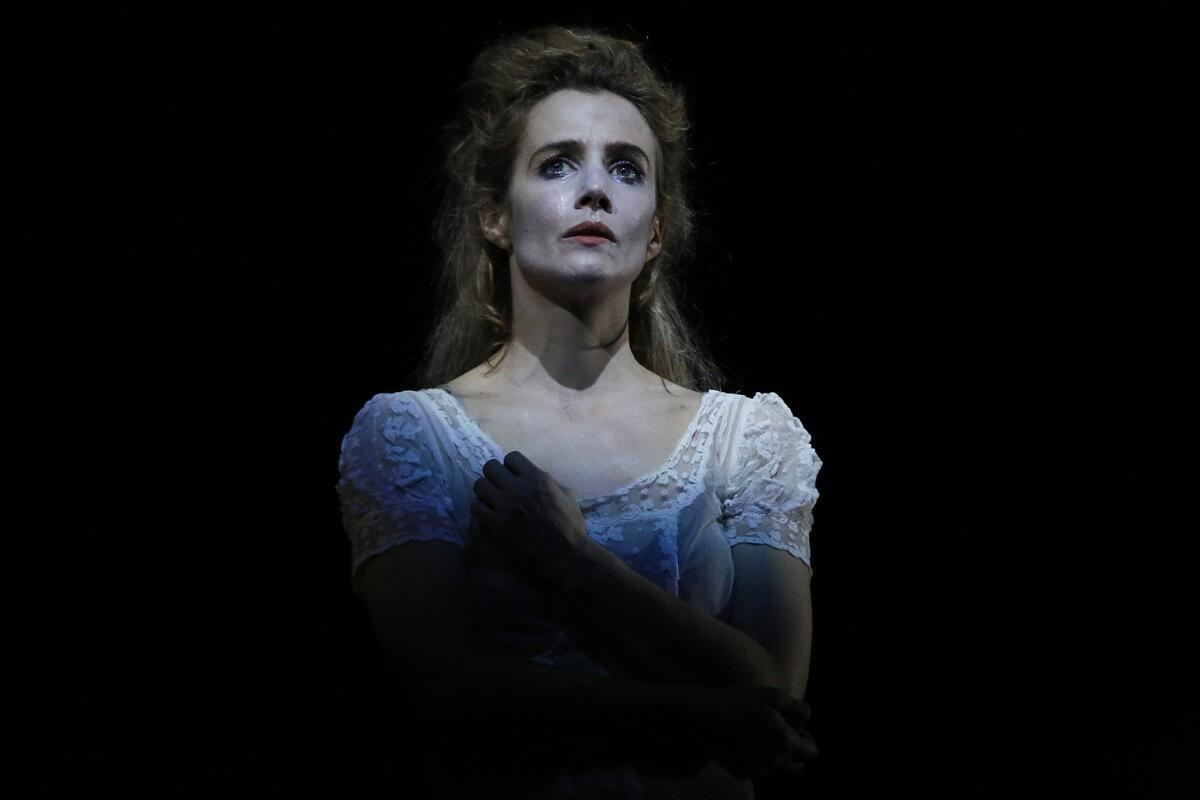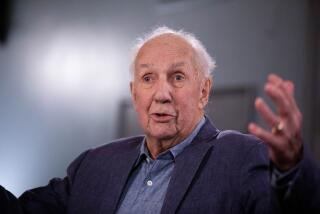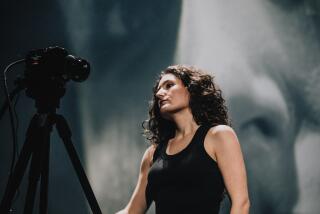Review: If you’re going to see Beckett’s late short plays, Lisa Dwan is the actress you want to perform them

Lisa Dwan performs in “The Beckett Trilogy” at Broad Stage in Santa Monica.
Before Irish actress Lisa Dwan takes the stage for the “Beckett Trilogy” she has been performing internationally to much acclaim, theatergoers are warned that they are about to be plunged into complete darkness.
A representative from the Broad Stage, where this bill of three short plays by Irish playwright Samuel Beckett opened Thursday, went to inordinate lengths to stave off a wave of night terrors in the audience. Should the pitch-black house prove overwhelming, all anyone would need to do is utter the word “usher” and help would swiftly be on its way, he reassured us, as though tucking us safely into bed before turning off the lights.
Such solicitude was perhaps excessive for a production that lasts just under an hour and features the spectral lighting design of James Farncombe gorgeously framing Dwan as she portrays the tormented women on this bill comprising “Not I,” “Footfalls” and “Rockaby.”
See more of Entertainment’s top stories on Facebook >>
Darkness, of course, was Beckett’s oldest friend. A line from “Krapp’s Last Tape” swam into my mind as the preshow speech droned on interminably: “the dark I have always struggled to keep under is in reality my most — unshatterable association.”
What is frightening about these works (being presented at the Santa Monica venue through Sunday) isn’t the dimness of the physical production but the blinding illumination of existence as a wound. Consciousness for Beckett was a bad bargain, yet he created astonishingly original theater out of the recognition that life, the unasked-for gift, is an unavoidably cruel, often savagely comic sentence for sentient beings.
After the march of masterworks (“Waiting for Godot,” “Endgame,” “Happy Days” and “Krapp’s Last Tape”), Beckett’s work became more concise and constricted. His art pared all inessentials to expose something basic in the human condition that “story,” forget about plot, could distract us from.
To appreciate the Beckett sampling here, it is important to recognize the distinction between poetry in the theater and poetry of the theater. Beckett succeeded in revolutionizing drama not just by redeploying language in the theater (as T.S. Eliot attempted and largely failed to do in his verse plays) but by reordering the entire vocabulary and grammar of the stage.
Silence as well as speech, movement along with stillness, tangled threads of tragedy and comedy, a succession of searing images substituting for story — these are the items in Beckett’s tool kit as a dramatic poet.
It takes a brave actor to perform any one of these monologues (for that is what they are, in effect) included in this bill. They are formidably difficult to memorize (defying as they do easy narrative coherence), and they place unusual physical demands — a chiropractic nightmare, in fact, of prolonged immobility and repetitive motion.
“Not I” presents a mouth bobbing in the dark as it releases a torrent of bruised speech. “Footfalls,” which Beckett sometimes referred to as his “pacing play,” features a woman treading back and forth in a ritualized communion with her dying mother’s voice. “Rockaby” gives us a woman in a rocking chair rocking herself off to a permanent sleep as her recorded thoughts resound.

Lisa Dwan performs in the “Beckett Trilogy” at the Broad Stage in Santa Monica.
Beckett didn’t originally intend for these works to be performed together. Indeed, when the idea of doing “Footfalls” and “Rockaby” on the same bill was once proposed to him, he demurred, fearing the “tiresome duplication of same device.”
Both plays involve disembodied voices, and Beckett understood that the logistical coordination was exceedingly challenging. He worried that the choreography, as important to him as the language, might get short shrift.
Thanks to the meticulous oversight of Walter Asmus, a German director who collaborated closely with Beckett late in the playwright’s career and is considered one of his foremost interpreters, the pairing of “Footfalls” and “Rockaby” is pulled off with great finesse.
It’s the inclusion of “Not I” that proves problematic. But this is a rare opportunity to see these works carried out by a performer who is considered by some to be the heir to Billie Whitelaw, the English actress the exacting Beckett returned to again and again.
Whitelaw, who died in 2014 but whose stunning performances live on through videos and films (D.A. Pennebaker’s documentary of the making of “Rockaby” is an indelible classic), coached Dwan, who shares her quality of self-effacement. This is one of the distinguishing marks of the very best Beckettian actors (along with an agile voice, a spine for slapstick and raw humanity). Celebrity aura is anathema to Beckett’s theater. Performers who excel in his work are those whose greatest wish is to subsume themselves in his art.
Dwan’s speed of delivery shaves several minutes off Whitelaw’s handling of “Not I” but at too high a cost. Most of the words are unintelligible. I had reread the text and watched Whitelaw’s version before the show and the only utterances I could decipher were those cries of refusal and rejection that Dwan italicizes in screams.
The rantings of the mouth in “Not I” aren’t meant to be painstakingly parsed, but too much of the context of this mad old woman, whose birth was an accident (“so no love … spared that … no love such as normally vented on the … speechless infant”) and whose mind keep reverting to some traumatic incident in a field, is lost.
“Not I,” which works exceedingly well on YouTube, requires a more intimate space than the Broad Stage. The mouth looked like a pinprick at points, as the lighting supervisor occasionally appeared to miss the target. Dwan and Asmus do away with the silent auditor, a liberty Beckett (normally a stickler) consented to in subsequent productions before his death in 1989. But the more troubling aspect is the treatment of the text as an Olympic test for Dwan.
“Footfalls” and “Rockaby,” fortunately, are superbly executed. Dwan doesn’t so much enact these plays as take possession of them in the manner of a spirit on temporary leave from purgatory. Her embodied pathos unites these explorations of daughters imprisoned in their own skulls. Her rhythmic movements are coordinated perfectly with Beckett’s words, which function more like a score than a traditional play.
This selection of works, while thematically linked, doesn’t showcase Beckett’s full range and musicality as a playwright. His scalding irony and verbal wit aren’t much in evidence here, and Dwan doesn’t capitalize on the fleeting possibilities that arise. But she brings a fortifying poignancy to these nocturnal murmurings that will better equip us for that ultimate confrontation with the inescapable dark.
Twitter: @CharlesMcNulty
More to Read
The biggest entertainment stories
Get our big stories about Hollywood, film, television, music, arts, culture and more right in your inbox as soon as they publish.
You may occasionally receive promotional content from the Los Angeles Times.







